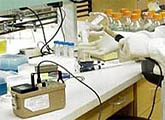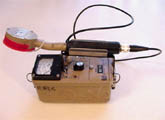Radiation Survey: Requirements
See radiation survey requirements for UC San Diego researchers, survey schedules, methods, and instruments.
Requirement
State and federal regulations require UC San Diego to perform documented surveys to detect surface contamination in areas where radioactive materials are used, including storage and waste facilities.
Survey frequency
Required: The required frequency of radiation contamination surveys depends the laboratory classification specified in your Radioisotope Use Authorization (RUA):
- Low-use lab – monthly
- High-use lab – weekly
- Greater than 10 millicurie (mCi) per experiment – daily or after each use
Contact the Health Physicist for your location if you do not know your lab classification.
Recommended: Environment, Health & Safety (EH&S) recommends meter surveys before and after each use of radioactive materials.
Direct or indirect survey?
The type of radioisotope and area to be surveyed determine whether you need to perform a direct or indirect survey.
- See Radiation Survey: Procedures for step-by-step instructions on both methods.
Direct survey
 Use a meter and probe to provide an immediate indication of contamination. Perform direct meter surveys for all isotopes except tritium. In areas of locally high background readings, such as near or on the outside of a waste container, both a direct and indirect survey are required.
Use a meter and probe to provide an immediate indication of contamination. Perform direct meter surveys for all isotopes except tritium. In areas of locally high background readings, such as near or on the outside of a waste container, both a direct and indirect survey are required.
Indirect survey
Use wipe tests for tritium use. You can substitute wipe tests for meter surveys in areas where meter monitoring is impractical (e.g., inside a microfuge) or where very small amounts of activity (less than 1 microcurie) are used.
Survey instruments – meters and probes
Survey instruments operate on the same basic principles but have varying capabilities and limitations, depending on the type of probe being used. Select the probe appropriate for the radioactive materials used in your lab.
Geiger-Mueller probes
 These probes detect beta-emitting radioisotopes; however, they can not detect H-3 and are poor at detecting radioisotopes that emit only photon radiation.
These probes detect beta-emitting radioisotopes; however, they can not detect H-3 and are poor at detecting radioisotopes that emit only photon radiation.
Scintillation probes
These probes detect gamma- (or X-ray-) emitting radioisotopes.
See Additional Resources for Radiation Safety for vendors of survey instruments.
Notice: Refer to the Radiation Safety Manual (PDF) for a detailed description of the UC San Diego radiation safety program.